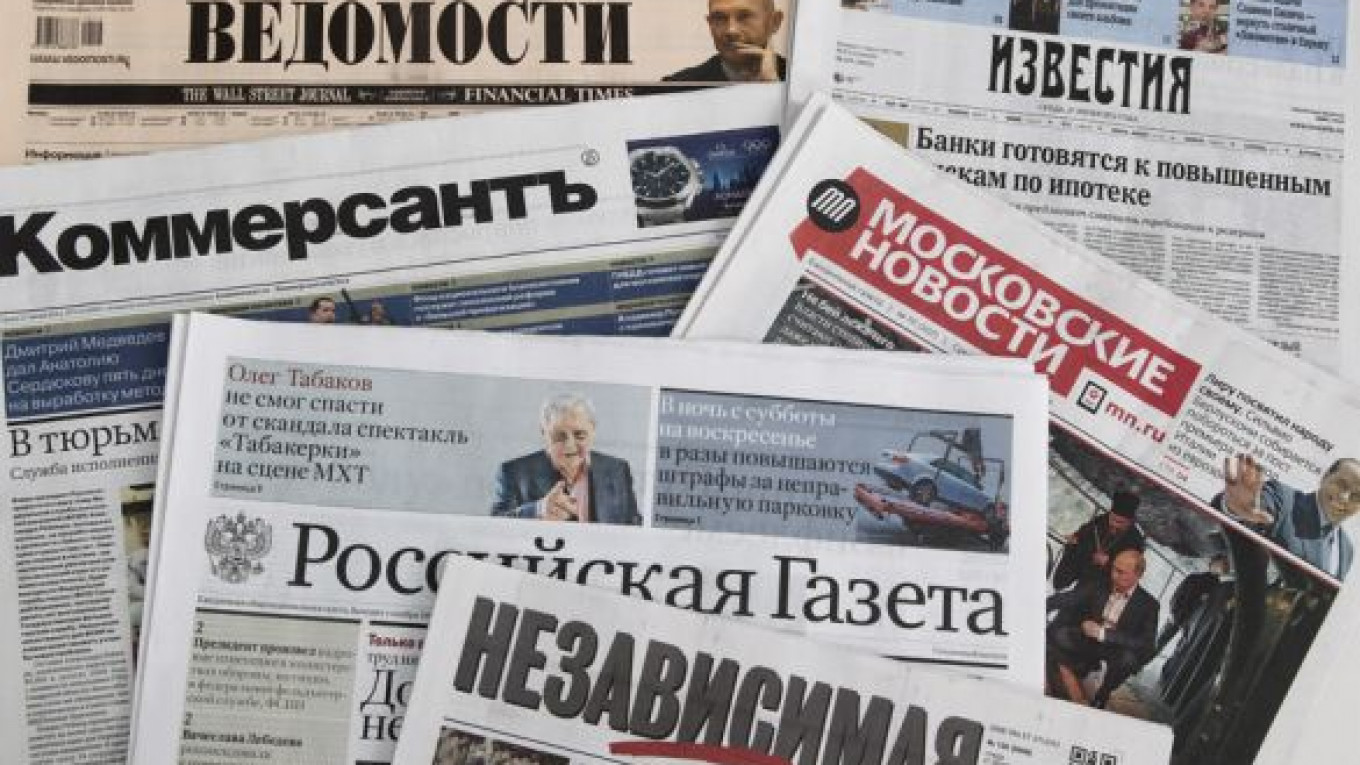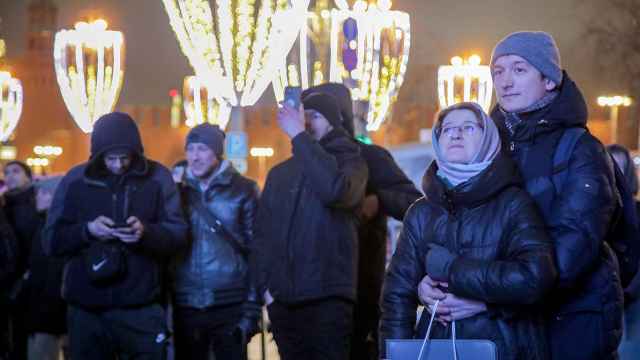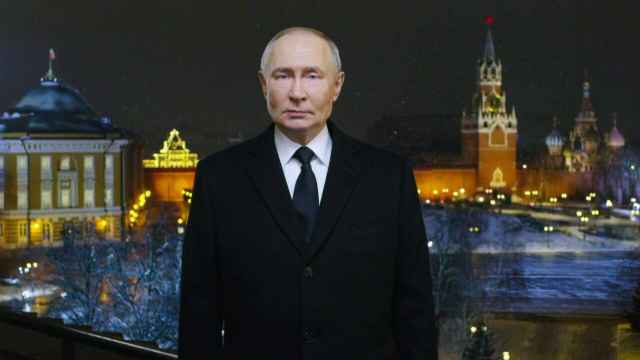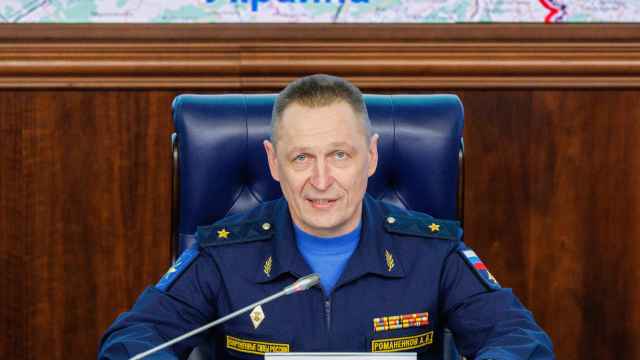Kommersant
3. Grigoriy Tumanov et al. article headlined "Russian prosecutors noticed in Germany" says that the German authorities and the EU are displeased with checks on two German funds operating in Russia as part of a large-scale audit of NGOs that started in February. This may have a adverse impact on Russian-German relations; pp 1, 5 (854 words).
4. Anna Balashova et al. article headlined "VTB comes to communications" says that the bank VTB has bought Russia's fourth biggest mobile phone operator by subscriber count, Tele2 Russia; pp 1, 12 (704 words).
5. Maksim Ivanov article headlined "People's Front expects simple formality from Vladimir Putin" says that a two-day conference of the All-Russia People's Front will open today in Rostov-na-Donu. President Vladimir Putin is expected to take part; p 2 (636 words).
6. Anna Pushkarskaya and Viktor Khamrayev article headlined "Administrative justice left without courts" says that Putin has submitted to the State Duma a draft administrative court proceedings code. An expected provision that should have maximized judges' independence from the executive authorities has been dropped; p 2 (742 words).
7. Kirill Belyaninov and Nikolay Sergeyev article headlined "Drug dealer reinstated in rights as Russian" says that the USA has extradited to Russia a St Petersburg resident charged with attempted drug smuggling. The Russian Foreign Ministry earlier accused the US authorities of violating the Russian's rights in the course of his detention; p 4 (660 words).
8. Aleksandr Chernykh article headlined "Academic and ministerial science go their own ways" that prominent Russian academicians Zhores Alferov and Vladimir Fortov have quit the public council at the Education and Science Ministry as a protest against Minister Dmitriy Livanov's policies; p 5 (633 words).
9. Oleg Sapozhkov article headlined "Regional Development Ministry without regional development" says that Deputy Regional Development Minister Yuriy Osintsev has been dismissed from his post; p 6 (559 words).
10. Yuriy Barsukov et al. article headlined "Olympic control for invisible market hand" says that prices for virtually all consumer services will be controlled by the Federal Antimonopoly Agency during the 2014 Winter Olympics in Sochi; p 6 (783 words).
11. Pavel Tarasenko article headlined "Europe prepares to meet terrorists" says that the UK Home Office has said that hundreds of Muslims with European passports, who are currently fighting in Syria on the side of radical groups, will start to return to the EU soon. British law enforcers warn that they may stage large-scale terrorist attacks; p 7 (548 words).
12. Sergey Strokan article headlined "BRICS countries fix up new documents" says that the fifth summit of the BRICS countries has finished in Durban, South Africa. Despite bold declarations and the signing of a number of documents, the BRICS leaders were unable to make progress towards becoming something more than a dialogue mechanism, the author notes; p 8 (716 words).
13. Maksim Yusin article headlined "UN peacemakers need partner in Mali" quotes UN Secretary-General Ban Ki-moon as saying that the UN will deploy a peacekeeping mission in Mali only if it is accompanied by a parallel "force" that will fight against Islamist extremists. This force is thought to be French troops; p 8 (368 words).
14. Comment by Moscow Carnegie Centre director Dmitriy Trenin published in the "Price of issue" column comments on the performance of the BRICS group; p 8 (370 words).
15. Kirill Belyaninov article titled "Mark Zuckerberg building political network" says the founder of Facebook is planning to create a structure one of the main goals of which will be to recruit top specialists from around the world to work in America; p 8 (400 words).
16. Olga Mordyushenko article headlined "Gazprom to grow in Bolivia" says that the Russian gas giant Gazprom has obtained permission from the Bolivian authorities to take part in the development of two gas deposits in the country; p 11 (622 words).
17. Mikhail Serov et al. article titled "Russia rejected Cyprus just in time" looks at a possible conflict between Turkey and Cyprus over disputed gas deposits in the region; p 11 (550 words).
18. Vladislav Novyy interview headlined "'If they start to 'take down' a region, a city or the entire country - good bye'" with the head of the Kasperskiy Laboratory, Yevgeniy Kasperskiy, who speaks about cyber threats and other topical issues; p 13 (2,771 words).
Nezavisimaya Gazeta
1. Aleksandra Samarina article headlined "Dmitriy Medvedev's March notions" says that at a meeting with One Russia activists, PM Medvedev essentially reasserted his ambitions for national leadership by providing an alternative, "modernized" definition of Russian conservatism. Such a political stance is said to accord with the views of the majority of Russians, opinion polls show; p 1, 3 (1,051 words).2. Sergey Kulikov article headlined "Whom Chubays' lamp shines for" speaks about the 10th anniversary of electric energy reform in Russia; p 1, 4 (852 words).
3. Vladimir Mukhin article headlined "Sergey Shoygu to add heat to Osinoye Gnezdo" says Defence Minister Sergey Shoygu announced plans to equip Russian submarines with long-range precision-guided weapons during his visit to the Pacific Fleet headquarters in Kamchatka Territory; p 1, 5 (653 words).
4. Tatyana Ivzhenko article headlined "Russians promised fight instead of march" predicts possible clashes between that supporters of Ukraine's Russian bloc and Freedom parties after at a rally dedicated to the liberation of the city Mykolaiv from Fascists; p 1, 6 (1,017 words).
5. Yuriy Paniyev article headlined "Development bank is still tough nut for BRICS to crack" says that at a meeting in Durban, South Africa, BRICS member-states agreed to establish a business council but failed to come to an agreement on the creation of a development bank; p 1, 7 (581 words).
6. Yevgeniy Grigoryev article headlined "Checks on German roads" looks at a possible deterioration in Russian-German ties as a result of prosecutor's checks on the Russian branches of German NGOs; p 1, 7 (570 words).
7. Aleksey Gorbachev article headlined "Psychological methods to be used to pacify observers" considers instructions for district electoral commission members as to how to deal with observers at the mayoral election in the Moscow Region town of Zhukovskiy set for 31 March; p 2 (848 words).
8. Editorial headlined "In risk zone" looks at a report by the Institute for Problems of Natural Monopolies, which casts doubts on the competitive capacity of the Russian fuel and energy sector; p 2 (490 words).
9. Ivan Rodin article headlined "Court for authorities" says that the State Duma has started to consider a set of bills tabled by the president on establishing administrative courts in Russia; p 2 (874 words).
10. Comment piece by pundits Viktor Yesin and Sergey Rogov headlined "30 years of bluff" considers US missile defence plans and the Russian-US dialogue on the contentious subject; p 3 (840 words).
11. Saveliy Vezhin article headlined "One Russia gets behind school desks" says that the One Russia party has launched an intra-party education project. PM Medvedev delivered the first lecture to the party's regional branches via video link yesterday; p 3 (1,143 words).
12. Anastasiya Bashkatova article headlined "Cyprus losses to be compensated as for 2008 crisis" says that the state-run bank VEB will set up a special fund to support Russian companies that suffered from the Cypriot financial crisis; p 4 (755 words).
13. Viktoriya Panfilova article headlined "Allies fail to agree on Syr Darya [River]" says that Uzbekistan's President Islom Karimov will arrive in Moscow on 15 April to discuss regional security with President Putin in light of the upcoming withdrawal of international troops from Afghanistan; p 6 (731 words).
14. Darya Tsilyurik article headlined "West denies no-fly zone to Syrian opposition" says that the Arab League member-states that met in Doha, Qatar, have said that they have a right to supply arms to the Syrian opposition. Meanwhile, NATO has rejected a demand by the Syrian president's opponents to establish a no-fly zone in the country's north; p 7 (616 words).
15. Vladimir Skosyrev article headlined "Women squeezing men in US secret services" says that women are playing increasingly significant role in US security structures: Julia Pierson has been appointed head of the US Secret Service, while another woman has been nominated for the head of the CIA department in charge of recruiting foreign agents; p 7 (639 words).
Vedomosti
1. Yelizaveta Sergina article headlined "To buy and share" says that the bank VTB has bought mobile phone operator Tele2 Russia. The bank plans to split up and sell off the company by parts to the "big three" Russian mobile phone operators (MTS, Megafon and VimpelCom); pp 1, 17 (548 words).2. Margarita Lyutova and Polina Khimshiashvili article headlined "Guarantee worth 100bn dollars" says that the BRICS member-states have come to an in-principle agreement to set up their own financial institutions that are supposed to become alternatives to the IMF and World Bank; pp 1, 3 (533 words).
3. Editorial headlined "Constant in change" comments on PM Medvedev's new interpretation of conservatism in Russia, articulated at the launch of a new One Russia party education project; pp 1, 6 (416 words).
4. Maksim Glikin article headlined "Apparently parliament is not working" says that a public opinion survey conducted by the Levada Centre pollster has shown that 37 per cent of Russians believe that the State Duma completely depends on the executive authorities and fulfils all of the Kremlin's wishes, and just 17 per cent of respondents think that the State Duma is independent; p 2 (366 words).
5. Anastasiya Kornya article headlined "Trial by e-mail" reports on the draft administrative court proceedings code that the president has tabled with the State Duma; p 2 (500 words).
6. Mariya Zheleznova et al. article headlined "In search of declarations" says that according to the Centre for Anticorruption Studies at Transparency International Russia, 16 governors and 22 regional legislative assembly deputies are ignoring the obligation to publish their income declarations; p 3 (470 words).
7. Maksim Tovkaylo et al. article titled "Olympics by state prices" considers price controls on services that are expected to be brought in for the Sochi Olympics; p 4 (300 words).
8. Aleksey Nikolskiy article headlined "Hand of state aid" looks at a proposal by pro-Kremlin experts for the state to provide support to designated socially-oriented NGOs; p 4 (250 words).
9. Editorial headlined "False alarm" contemplates the reason for why the Russian authorities have lost interest in the developments in crisis-stricken Cyprus; p 6 (310 words).
10. Kirill Titayev commentary titled "Sirs, perish with you registration" looks at a controversial bill toughening place-of-residence registration rules in Russia; p 6 (600 words).
11. Aleksey Zakharov commentary headlined "Cause and effect: Five rules of successful dictator" assesses the likelihood of Vladimir Putin stepping down voluntarily; p 6 (746 words).
12. Mariya Eysmont opinion piece titled "Struggle of controllers" considers the campaign of prosecutor's checks on NGOs in Russia; p 7 (300 words).
13. Dmitriy Simakov article titled "Company of the week: TNK-BP" analyses the impact of Rosneft's acquisition of TNK-BP on the latter's former shareholders; p 7 (300 words).
14. Yekaterina Sobol article titled "Pogosyan brings in his son" says Artem Pogosyan, the son of the president of the United Aircraft Construction Corporation (OAK), Mikhail, has been appointed vice-president of an OAK subsidiary, the Sukhoi Civil Aircraft company; p 11 (300 words).
15. Irina Kezik article titled "Mongolian route" says that Russian gas transport giant Transneft has proposed an alternative route for oil supplies to China, passing through Mongolia rather than Kazakhstan to reduce costs; p 12 (450 words).
16. Oleg Salmanov article headlined "Aleksandr Provorotov yields seat" looks at the replacement of Aleksandr Provorotov with Sergey Kalugin as the president of the state-owned communications giant Rostelekom; p 16 (505 words).
Izvestia
1. Viktor Loginov's brief interview with Aleksandr Provorotov, the now former president of the Rostelekom communications company, headlined "'I decided that quitting would be better both for me and the company'", who comments on his resignation; p 1 (434 words).
2. Dmitriy Yevstifeyev article headlined "New R650m-case found for Yelena Skrynnik" speaks about a possible new case on fraud at the state-owned Rosagroleasing company, which used to be headed up by former Agriculture Minister Yelena Skrynnik; pp 1, 4 (1,001 words).
3. Yuliya Tsoy and Yegor Sozayev-Guryev article titled "President against gays adopting children" says that President Putin has said he opposes the idea of Russian orphans being adopted by foreign same-sex couples; pp 1-2 (400 words).
4. Anastasiya Kashevarova article titled "Kremlin shutting down ineffective funds" says that the Kremlin has decided against the planned launch of two of four research institutions, opting to outsource the analytical work they were supposed to carry out; pp 1, 4 (350 words).
5. Yelena Teslova article headlined "Lev Ponomarev summoned to Moscow prosecutor's office" says that rights veteran Lev Ponomarev have been summoned for questioning in connection with his For Human Rights organization, which is said to continue receiving financing from abroad despite refusing to register as a "foreign agent"; p 2 (332 words).
6. Petr Kozlov and Svetlana Subbotina article headlined "Kostin's fund advises NGOs to look after people" says that a pro-Kremlin think tank has prepared a report on Russian NGOs and proposed reforms for the sector; p 3 (455 words).
7. Konstantin Volkov article headlined "Russia lags behind China in trade with Africa" features pundit comment on economic cooperation between Russia and South Africa; p 7 (576 words).
8. Opinion piece by Maksim Sokolov headlined "Minor official Livanov and academicians" contemplates the conflict between Education and Science Minister Dmitriy Livanov and academicians over his ministry's policies; p 9 (707 words).
Rossiiskaya Gazeta
1. Vladislav Kulikov article headlined "Painful measure" looks at a draft administrative court proceedings code submitted to the State Duma by President Putin; pp 1-2 (905 words).
2. Kira Latukhina article headlined "Five - one" focuses on Putin's meeting with his South African counterpart on the sidelines of the BRICS summit in Durban; p 2 (714 words).
3. Vladimir Kuzmin article titled "Study, party!" reports on PM Medvedev's inaugural lecture as part of the Civil University project designed to provide training for One Russia party members; p 3 (700 words).
4. Vitaliy Petrov article headlined "To the front again" previews the All-Russia People's Front conference opening in Rostov-na-Donu today; p 3 (500 words).
5. Irina Rybnikova interview headlined "Regional Muscovites" with acting Moscow Region governor Andrey Vorobyev, who speaks about his leadership aspirations; p 6 (2,468 words).
6. Maksim Makarychev article headlined "Tail wags dog" gives an account of the Arab League summit in Doha; p 8 (652 words).
7. Igor Dunayevskiy article titled "Obama finds himself a woman" comments on the appointment of Julia Pierson as US Secret Service chief; p 8 (250 words).
Rossiiskaya Gazeta (weekly)
1. Viktor Feshchenko article titled "Suffocated" comments on the results of a postmortem on Boris Berezovskiy by the UK authorities, which found that the exiled tycoon died as a result of a hanging; p 5 (500 words).
2. Mikhail Barshchevskiy interview with State Duma deputy chairwoman Lyudmila Shvetsova, headlined "Learning to live long", who speaks about the social and demographic situation in Russia; p 8 (1,295 words).
Moskovskiy Komsomolets
1. Tatyana Zamakhina article headlined "Pavel Gusev unanimously elected chairman of Moscow Union of Journalists" reports on the 7th conference of the Moscow Union of Journalists, at which Moskovskiy Komsomolets editor in chief Pavel Gusev was re-elected chairman; pp 1-2 (595 words).
2. Irina Finyakina article headlined "What killed Maksim Kuzmin?" criticizes the adoptive mother of Russian boy Maksim Kuzmin who died in the USA for not taking proper care of the child; p 1 (577 words).
3. Yekaterina Sveshnikova and Irina Bobrova article headlined "The number 68 conceals secret of Berezovskiy's death" suggests that exiled Russian oligarch Boris Berezovskiy did not want to live longer than several of his family members, who died at the age of 68; pp 1, 5 (750 words).
4. Mikhail Zubov article headlined "Vitaliy Malkin and Boris Shpigel stop being senators" says that four senators - Vitaliy Malkin, Boris Shpigel, Svetlana Zhurova and Svetlana Orlova - have officially left the Federation Council; p 2 (657 words).
5. Viktoriya Prikhodko article headlined "Putin's security service scuffles with South Africans" comments on the BRICS summit in Durban, South Africa and criticizes shortcomings in the summit organization; p 2 (717 words).
6. Natalya Rozhkova article headlined "Medvedev asks One Russia not to be rude to media" zooms in on Medvedev's meeting with One Russia activists at a launch of a party education project; p 2 (520 words).
7. Irina Kuksenkova article headlined "Russia plans to return ambassador to Qatar" says that Russia is ready to appoint a new ambassador to Qatar despite the fact that official Doha has not apologized for an attack on the previous ambassador at a local airport; p 3 (436 words).
8. Renat Abdullin and Dina Karpitskaya interview with Natalya Vishnevskaya, the head doctor at the children's home from which Maksim Kuzmin was adopted by his US family, titled "'Maksim was not even hyperactive'", in which she questions the findings of a US autopsy on the boy; p 3 (731 words).
9. Matvey Ganapolskiy commentary headlined "Spy persecution mania" mulls possible questions that could be asked during President Putin's annual phone-in planned for April and contemplates his most likely answers; p 3 (1,120 words).
10. Natalya Rozhkova article headlined "Everything for the front: All-Russia People's Front" recalls the history of the All-Russia People's Front and looks at the prospects for its further development; p 4 (1,289 words).
RBK Daily
1. Anastasiya Fomicheva and Nadezhda Ageyeva article headlined "Kostin called Sweden" says that Russian VTB bank has acquired 100 per cent of shares of Tele2 Russia mobile operator from the Swedish shareholder; pp 1, 7 (400 words).
2. Aleksandr Litoy article headlined "Wikipedia of corruption" says that the opposition is to create a website similar to Wikipedia, listing all the latest fraud scandals in Russia. The People's Alliance movement that is launching the project also aims to gain the status of a party from the Justice Ministry; p 2 (400 words).
3. Yuliya Yakovleva article headlined "Orientation change" says that according to the study conducted by the Foundation for the Development of Civil Society, Russian NGOs should get state support and switch from monitoring to social help; p 2 (450 words).
4. Ivan Petrov article headlined "Protection from officials" says that President Putin has initiated the creation of administrative courts that will prosecute officials for violating the rights of citizens and corporate bodies. Experts welcome the move, although doubt its efficiency; p 2 (550 words).
5. Inga Vorobyeva article headlined "Break the bank" features a report from the fifth summit of the BRICS in Durban; p 3 (600 words).
6. Anastasiya Fomicheva article headlined "Rostelekom president leaves" comments on the reshuffle in the Rostelekom company as its board of directors has approved the company head Aleksandr Provotorov's early termination of power; p 8 (900 words).
Novyye Izvestia
1. Sergey Putilov article headlined "Pension police" says that the Russian Pension Fund wants to take control of businessmen's bank accounts to supervise insurance payments; pp 1, 3 (621 words).
2. Nadezhda Bulanova article headlined "To do without in God's way" says that the Russian Orthodox Church has put forward an initiative to introduce a new subject at schools called "Meaning of life"; pp 1, 5 (429 words).
3. Vera Moslakova article headlined "By most honest calculations" says that only 10 per cent of electoral commissions in Russia have been manned with civil activists; p 2 (689 words).
4. Anastasiya Dolgova article headlined "American parents gave not enough pills to Maksim Kuzmin" comments on the results of autopsy on Maksim Kuzmin, a Russian kid adopted by American parents who died in January 2013; p 5 (250 words).
Komsomolskaya Pravda
1. Tatyana Reut article headlined "Americans put blame on Maksim Kuzmin for his own death" comments on the results of autopsy on Maksim Kuzmin; p 6 (300 words).
2. Oleg Potapov interview with Andrey Bocharov, a member of the All-Russian People's Front, on the upcoming conference in Rostov-on-Don devoted to Vladimir Putin's pre-election promises; p 12 (1,500 words).
Komsomolskaya Pravda (weekly)
1. Anna Veligzhanina article headlined "Berezovskiy's look-a-like died instead of him?" says there are too many questions surrounding the death of Russian tycoon Boris Berezovskiy and features comments of those who knew Berezovskiy personally; pp 4-5 (1,600 words).
Krasnaya Zvezda
1. Viktor Ruchkin article headlined "'Balance' of LAS" analyses the resolution adopted by the League of Arab States that allows its member states to support Syrian opposition; pp 1, 3 (550 words).
Trud
1. Yevgeniy Akatov article headlined "What is gone together with Berezovskiy" features pundits' comments on the role of exiled tycoon in Russian history; p 3 (500 words).1. Aleksandra Samarina article headlined "Dmitriy Medvedev's March notions" says that at a meeting with One Russia activists, PM Medvedev essentially reasserted his ambitions for national leadership by providing an alternative, "modernized" definition of Russian conservatism. Such a political stance is said to accord with the views of the majority of Russians, opinion polls show; p 1, 3 (1,051 words).
2. Sergey Kulikov article headlined "Whom Chubays' lamp shines for" speaks about the 10th anniversary of electric energy reform in Russia; p 1, 4 (852 words).
3. Vladimir Mukhin article headlined "Sergey Shoygu to add heat to Osinoye Gnezdo" says Defence Minister Sergey Shoygu announced plans to equip Russian submarines with long-range precision-guided weapons during his visit to the Pacific Fleet headquarters in Kamchatka Territory; p 1, 5 (653 words).
4. Tatyana Ivzhenko article headlined "Russians promised fight instead of march" predicts possible clashes between that supporters of Ukraine's Russian bloc and Freedom parties after at a rally dedicated to the liberation of the city Mykolaiv from Fascists; p 1, 6 (1,017 words).
5. Yuriy Paniyev article headlined "Development bank is still tough nut for BRICS to crack" says that at a meeting in Durban, South Africa, BRICS member-states agreed to establish a business council but failed to come to an agreement on the creation of a development bank; p 1, 7 (581 words).
6. Yevgeniy Grigoryev article headlined "Checks on German roads" looks at a possible deterioration in Russian-German ties as a result of prosecutor's checks on the Russian branches of German NGOs; p 1, 7 (570 words).
7. Aleksey Gorbachev article headlined "Psychological methods to be used to pacify observers" considers instructions for district electoral commission members as to how to deal with observers at the mayoral election in the Moscow Region town of Zhukovskiy set for 31 March; p 2 (848 words).
8. Editorial headlined "In risk zone" looks at a report by the Institute for Problems of Natural Monopolies, which casts doubts on the competitive capacity of the Russian fuel and energy sector; p 2 (490 words).
9. Ivan Rodin article headlined "Court for authorities" says that the State Duma has started to consider a set of bills tabled by the president on establishing administrative courts in Russia; p 2 (874 words).
10. Comment piece by pundits Viktor Yesin and Sergey Rogov headlined "30 years of bluff" considers US missile defence plans and the Russian-US dialogue on the contentious subject; p 3 (840 words).
11. Saveliy Vezhin article headlined "One Russia gets behind school desks" says that the One Russia party has launched an intra-party education project. PM Medvedev delivered the first lecture to the party's regional branches via video link yesterday; p 3 (1,143 words).
12. Anastasiya Bashkatova article headlined "Cyprus losses to be compensated as for 2008 crisis" says that the state-run bank VEB will set up a special fund to support Russian companies that suffered from the Cypriot financial crisis; p 4 (755 words).
13. Viktoriya Panfilova article headlined "Allies fail to agree on Syr Darya [River]" says that Uzbekistan's President Islom Karimov will arrive in Moscow on 15 April to discuss regional security with President Putin in light of the upcoming withdrawal of international troops from Afghanistan; p 6 (731 words).
14. Darya Tsilyurik article headlined "West denies no-fly zone to Syrian opposition" says that the Arab League member-states that met in Doha, Qatar, have said that they have a right to supply arms to the Syrian opposition. Meanwhile, NATO has rejected a demand by the Syrian president's opponents to establish a no-fly zone in the country's north; p 7 (616 words).
15. Vladimir Skosyrev article headlined "Women squeezing men in US secret services" says that women are playing increasingly significant role in US security structures: Julia Pierson has been appointed head of the US Secret Service, while another woman has been nominated for the head of the CIA department in charge of recruiting foreign agents; p 7 (639 words).
Vedomosti
1. Yelizaveta Sergina article headlined "To buy and share" says that the bank VTB has bought mobile phone operator Tele2 Russia. The bank plans to split up and sell off the company by parts to the "big three" Russian mobile phone operators (MTS, Megafon and VimpelCom); pp 1, 17 (548 words).2. Margarita Lyutova and Polina Khimshiashvili article headlined "Guarantee worth 100bn dollars" says that the BRICS member-states have come to an in-principle agreement to set up their own financial institutions that are supposed to become alternatives to the IMF and World Bank; pp 1, 3 (533 words).
3. Editorial headlined "Constant in change" comments on PM Medvedev's new interpretation of conservatism in Russia, articulated at the launch of a new One Russia party education project; pp 1, 6 (416 words).
4. Maksim Glikin article headlined "Apparently parliament is not working" says that a public opinion survey conducted by the Levada Centre pollster has shown that 37 per cent of Russians believe that the State Duma completely depends on the executive authorities and fulfils all of the Kremlin's wishes, and just 17 per cent of respondents think that the State Duma is independent; p 2 (366 words).
5. Anastasiya Kornya article headlined "Trial by e-mail" reports on the draft administrative court proceedings code that the president has tabled with the State Duma; p 2 (500 words).
6. Mariya Zheleznova et al. article headlined "In search of declarations" says that according to the Centre for Anticorruption Studies at Transparency International Russia, 16 governors and 22 regional legislative assembly deputies are ignoring the obligation to publish their income declarations; p 3 (470 words).
7. Maksim Tovkaylo et al. article titled "Olympics by state prices" considers price controls on services that are expected to be brought in for the Sochi Olympics; p 4 (300 words).
8. Aleksey Nikolskiy article headlined "Hand of state aid" looks at a proposal by pro-Kremlin experts for the state to provide support to designated socially-oriented NGOs; p 4 (250 words).
9. Editorial headlined "False alarm" contemplates the reason for why the Russian authorities have lost interest in the developments in crisis-stricken Cyprus; p 6 (310 words).
10. Kirill Titayev commentary titled "Sirs, perish with you registration" looks at a controversial bill toughening place-of-residence registration rules in Russia; p 6 (600 words).
11. Aleksey Zakharov commentary headlined "Cause and effect: Five rules of successful dictator" assesses the likelihood of Vladimir Putin stepping down voluntarily; p 6 (746 words).
12. Mariya Eysmont opinion piece titled "Struggle of controllers" considers the campaign of prosecutor's checks on NGOs in Russia; p 7 (300 words).
13. Dmitriy Simakov article titled "Company of the week: TNK-BP" analyses the impact of Rosneft's acquisition of TNK-BP on the latter's former shareholders; p 7 (300 words).
14. Yekaterina Sobol article titled "Pogosyan brings in his son" says Artem Pogosyan, the son of the president of the United Aircraft Construction Corporation (OAK), Mikhail, has been appointed vice-president of an OAK subsidiary, the Sukhoi Civil Aircraft company; p 11 (300 words).
15. Irina Kezik article titled "Mongolian route" says that Russian gas transport giant Transneft has proposed an alternative route for oil supplies to China, passing through Mongolia rather than Kazakhstan to reduce costs; p 12 (450 words).
16. Oleg Salmanov article headlined "Aleksandr Provorotov yields seat" looks at the replacement of Aleksandr Provorotov with Sergey Kalugin as the president of the state-owned communications giant Rostelekom; p 16 (505 words).
Mar. 28, 2013/BBC Monitoring/©BBC
A Message from The Moscow Times:
Dear readers,
We are facing unprecedented challenges. Russia's Prosecutor General's Office has designated The Moscow Times as an "undesirable" organization, criminalizing our work and putting our staff at risk of prosecution. This follows our earlier unjust labeling as a "foreign agent."
These actions are direct attempts to silence independent journalism in Russia. The authorities claim our work "discredits the decisions of the Russian leadership." We see things differently: we strive to provide accurate, unbiased reporting on Russia.
We, the journalists of The Moscow Times, refuse to be silenced. But to continue our work, we need your help.
Your support, no matter how small, makes a world of difference. If you can, please support us monthly starting from just $2. It's quick to set up, and every contribution makes a significant impact.
By supporting The Moscow Times, you're defending open, independent journalism in the face of repression. Thank you for standing with us.
Remind me later.






